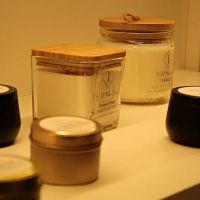Do Scented Candles Have an Impact on Plants? Understanding the Effects
- 1. Exploring the Impact of Scented Candles on Plants
- 2. Do Scented Candles Release Harmful Chemicals for Plants?
- 3. Effects of Scented Candles on Indoor Plants
- 4. How to Choose Plant-Friendly Scented Candles
- 5. Where to Buy Quality Scented Candles Safe for Plants
Scented candles are a popular addition to many homes, bringing warmth, fragrance, and ambiance to any room. But if you're a plant enthusiast, you might be wondering, "Do scented candles have an impact on plants?" After all, plants play an important role in our living spaces, purifying the air and adding a touch of nature. In this article, we'll dive into the potential effects that scented candles may have on your plants and whether it’s safe to burn them around your beloved greenery.
The main concern with burning scented candles around plants is whether the smoke, soot, or chemicals in the candles could negatively affect plant health. Understanding the types of candles you use and their ingredients can help you create a more plant-friendly environment while still enjoying the pleasant aromas that candles provide.
Do Scented Candles Release Harmful Chemicals for Plants?
The short answer is yes—some scented candles can release harmful chemicals into the air, which may have an adverse effect on plants. Many traditional candles are made from paraffin wax, which is derived from petroleum. When burned, paraffin candles can release toxins such as benzene and toluene, both of which are potentially harmful to plants and humans alike. These chemicals can interfere with photosynthesis, slow down plant growth, or even cause damage to plant leaves over time.
Additionally, many scented candles use synthetic fragrances, which can contain volatile organic compounds (VOCs). These VOCs, when inhaled by plants, can disrupt their ability to process nutrients and water, negatively impacting their overall health. Therefore, it’s important to be cautious about the types of candles you burn, especially if you have delicate or air-purifying plants in your home.
id="effects-of-scented-candles-on-indoor-plants">Effects of Scented Candles on Indoor Plants
The impact of scented candles on indoor plants largely depends on the quality of the candle and the frequency of use. If you regularly burn candles made from paraffin wax or those with artificial fragrances, you may notice some negative effects on your plants, such as yellowing leaves, stunted growth, or a decrease in overall vitality.
On the other hand, when you burn candles made from natural, non-toxic ingredients such as soy, beeswax, or coconut wax, the risk to plants is significantly reduced. These candles tend to burn cleaner and release fewer harmful chemicals, making them a better option for homes with plants. Furthermore, candles made with essential oils offer a more plant-friendly fragrance that can still enhance the atmosphere without posing a risk to your plants.
It’s also worth noting that plants, like humans, can react differently to various scents. While some plants may thrive in a space with light candle use, others may show signs of stress when exposed to certain aromas. As with any environmental factor, moderation is key when burning scented candles around your plants.
How to Choose Plant-Friendly Scented Candles
If you want to enjoy the benefits of scented candles without risking your plants' health, it’s important to choose candles made from natural, plant-friendly ingredients. Here are a few tips to guide your candle selection:
- Opt for Soy or Beeswax Candles: These natural waxes burn cleaner and produce less soot, making them safer for both plants and humans. They also tend to last longer, which means fewer candles to burn overall.
- Avoid Synthetic Fragrances: Choose candles that are scented with pure essential oils, which are derived from natural plant materials. Essential oils not only provide a more natural scent but also offer various therapeutic benefits.
- Check for Lead-Free Wicks: Some candles contain wicks that are coated in lead or other metals. These wicks can release toxic fumes when burned, which could affect plant health. Look for candles with cotton or wood wicks instead.
- Burn Candles in Moderation: Even with plant-friendly candles, it’s important not to overdo it. Limit the amount of time you burn candles around plants and ensure the area is well-ventilated to minimize any buildup of smoke or chemicals.
Where to Buy Quality Scented Candles Safe for Plants
If you’re looking for high-quality scented candles that won’t harm your plants, Scent Snob offers a variety of non-toxic, natural candles made from eco-friendly ingredients. Their selection includes soy and beeswax candles infused with pure essential oils, perfect for creating a cozy atmosphere while keeping your plants safe.
By choosing candles made with care and environmentally friendly ingredients, you can enjoy the soothing ambiance of scented candles without worrying about harming your plants. Visit Scent Snob today to find the perfect candle for your home and plant-friendly space.
Enjoy Safe and Soothing Scents with Plant-Friendly Candles
Scented candles can bring warmth, comfort, and a pleasant fragrance to your home, but it’s essential to choose the right candles to avoid harming your plants. By opting for natural, non-toxic candles and using them in moderation, you can create a space that is both relaxing for you and safe for your plants.
Ready to enjoy the benefits of plant-friendly scented candles? Visit Scent Snob to browse their selection of high-quality, natural candles and enhance your home with a touch of fragrance that’s safe for both you and your plants.



0 comments